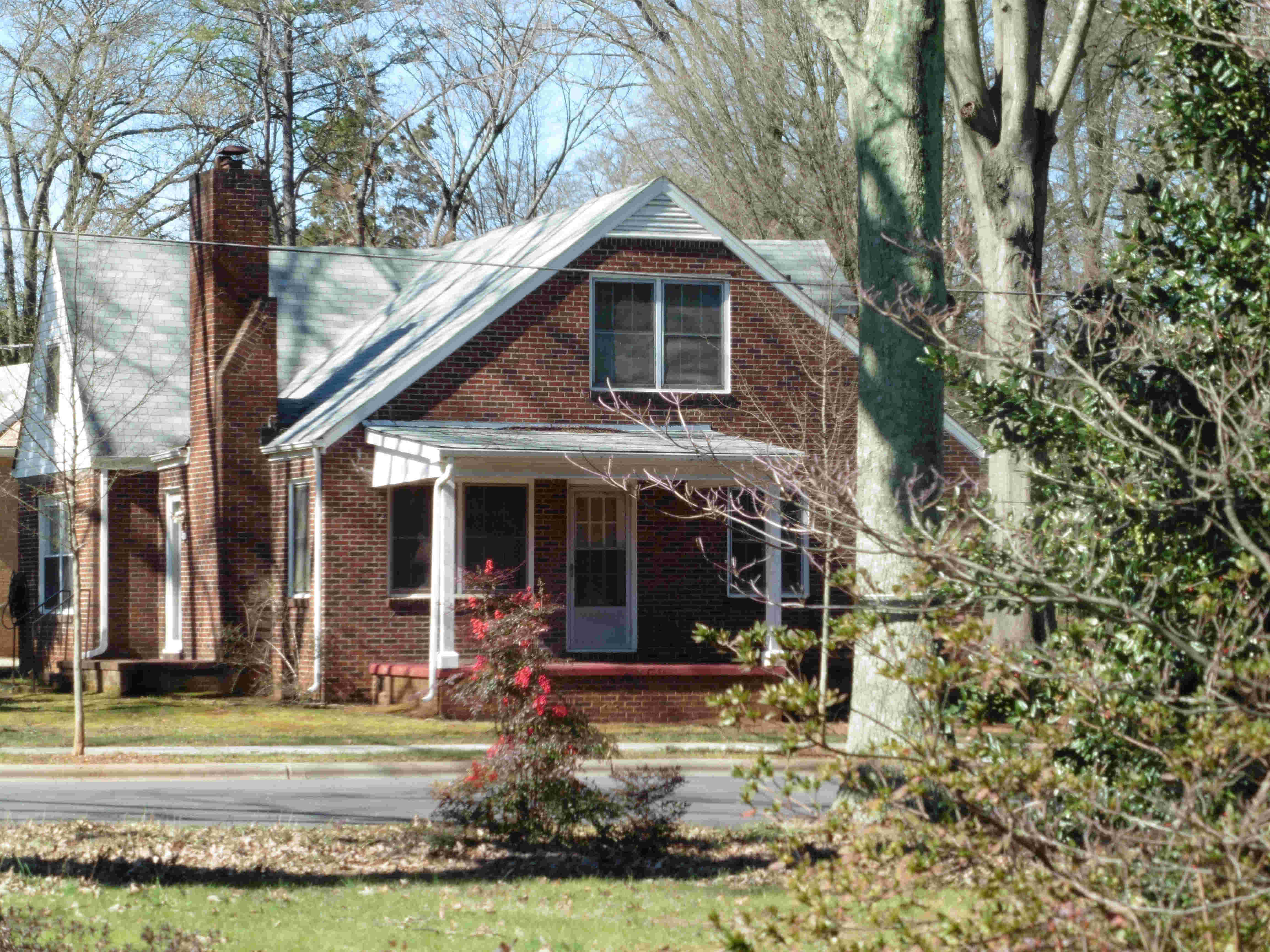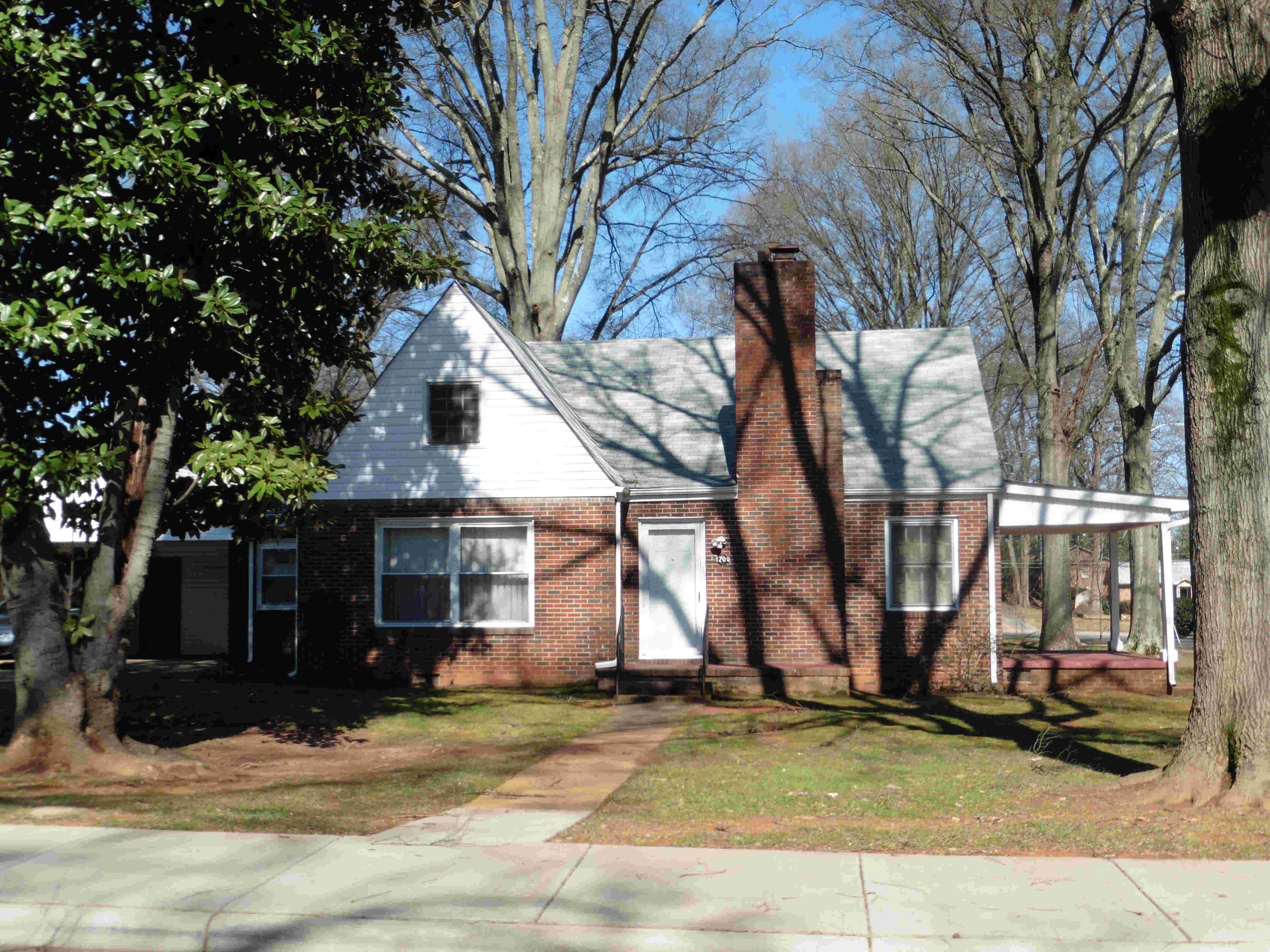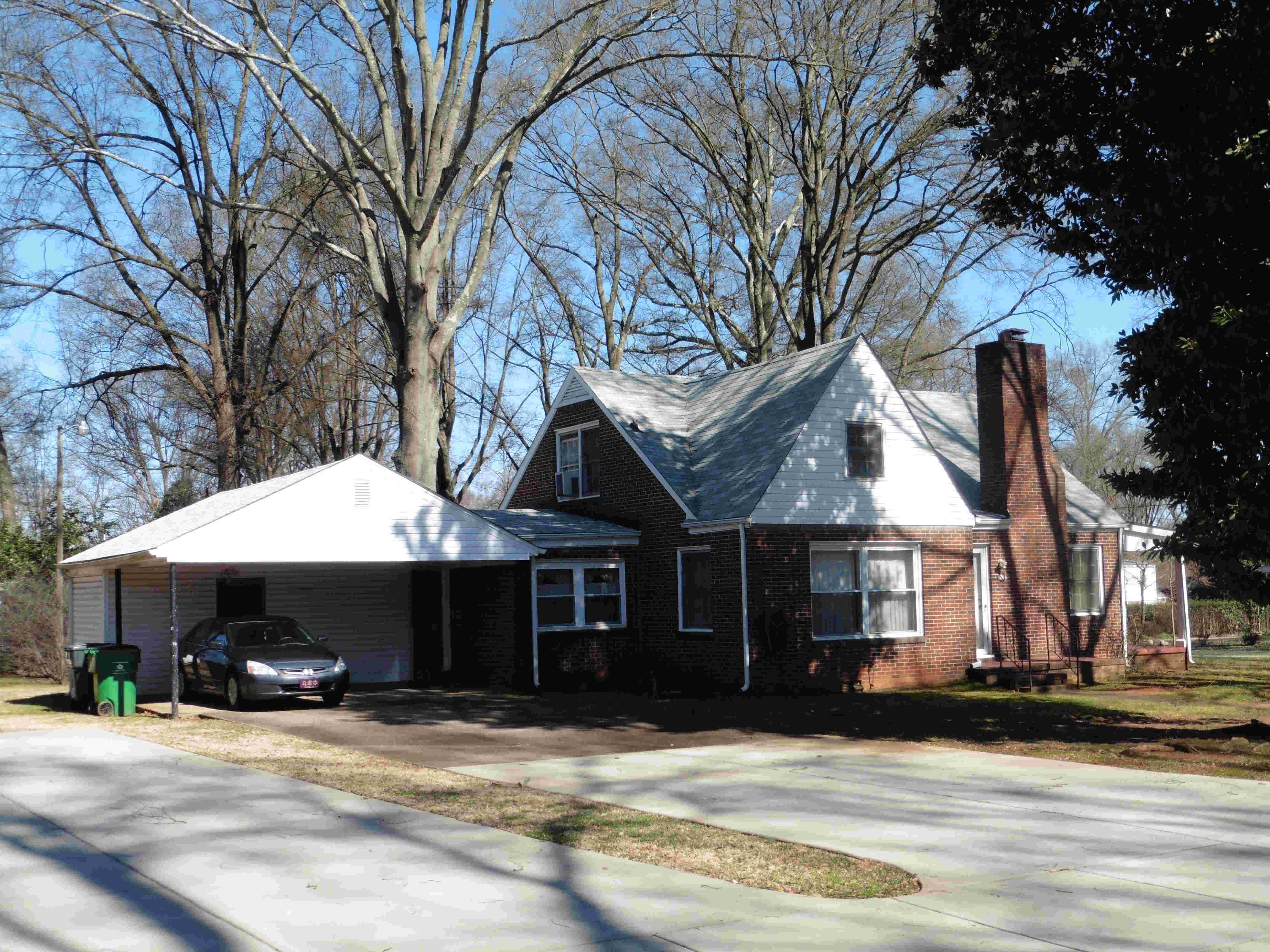1700 Washington Avenue
 The second house constructed during the post-WWII development of McCrorey Heights, this dwelling and its occupants set the tone for the neighborhood. Joseph C. Belton was principal at Clear Creek School, the main African American high school for rural students in the eastern part of Mecklenburg County. His wife Marjorie R. Belton led Charlotte’s Phyllis Wheatley Branch of the YWCA.
The second house constructed during the post-WWII development of McCrorey Heights, this dwelling and its occupants set the tone for the neighborhood. Joseph C. Belton was principal at Clear Creek School, the main African American high school for rural students in the eastern part of Mecklenburg County. His wife Marjorie R. Belton led Charlotte’s Phyllis Wheatley Branch of the YWCA.
Joseph Charles Belton (4.11.1914 – 3.14.1983), part of a remarkable family of African American institution-builders and Civil Rights leaders, hailed from Fairfield County, South Carolina. The Beltons likely had connections with the family of Rev. H.L. McCrorey, the Fairfield County native who became president of Charlotte’s Biddle College 1907 -1947 and transformed it into Johnson C. Smith University. In any case, Joseph Belton made his way to JCSU where he quickly distinguished himself as a leader, president of the Class of 1937. He went on to earn a Masters at University of Michigan, and eventually did additional study at UNC Chapel Hill, Columbia University in New York City, and what is now NC Central University in Durham, NC.
“His first professional employment was at a two room school, Coinjock Rosenwald School in Currituck County, NC,” remembers Joseph DeLaine, Jr, a nephew and next door neighbor. Belton did a stint in the Air Force, just as it was beginning to admit its first African American members in the 1940s, then came to the Queen City for good. He led Pineville’s Sterling High from 1944 to 1947, then “taught and served as principal at the Clear Creek Negro High School,” DeLaine recalls. It offered all grades, elementary through high school — the only high school available to black students in the rural eastern part of Mecklenburg County. Today it is known as J. H. Gunn Elementary, honoring a subsequent principal who in his younger years led Jimmy Gunn’s Dixie Serenaders, a big band that toured the eastern United States and recorded for RCA Victor. “After desegregation of public schools,” DeLaine continues, Belton “became the principal of the Marie G. Davis Elementary School until his retirement in 1974.”
Principal Belton’s community spirit did not end when he left school for home each day. He served as an elder at First United Presbyterian Church, was a member of Omega Psi Phi Fraternity, Inc., and volunteered on the board of the Bethlehem Center, a social service agency serving children and families in poverty. “He was a licensed ham radio operator and an avid bridge player,” said his funeral program, which noted his membership in the Metrolina Duplicate Bridge Association and the Bridgeteers social club.
Marjorie Mae Rowe Belton (5.6.1917 – 9.21.2000), who married Joseph Belton in 1941, was a rarity — an African American raised in the North who chose to move to the South in the pre-Civil Rights era. She grew up in White Plains, New York, valedictorian of her integrated high school. A full scholarship to Hampton Institute in Virginia pulled her southward. As president of the Hampton Choir, said her funeral program, “she took to heart the words of Hampton’s hymn: ‘let her life do the singing — go forth and give service to mankind.'”
Initially that meant teaching. She spent five years teaching history and French in rural Currituck County, NC, where she met and married Joseph. She would eventually attend Columbia Teachers College in New York City to earn a masters in education.<
When she and Joseph relocated to Charlotte in 1944, she joined the staff of the Phyllis Wheatly Branch of the YWCA. Named to honor the Colonial-era African American poet Phyllis Wheatly, it was one of the oldest and best black YWCAs in the South. “A very talented person with a magnetic personality, Marge was employed as Y-Teen Director in 1944,” her funeral program related. She soon stepped up to become the organization’s Executive Director, “inspiring women to do community service through volunteerism,” serving until 1957. She subsequently became a guidance counselor, initially at Second Ward High School and then at West Charlotte High, until retirement in 1979.
Marjorie and Joe Belton raised two sons in this house, David Belton, an assistant to North Carolina’s governor in the early 2010s, and Gordon Belton.
Marjorie’s community work was even more spirited than her husband’s. She was active in Charlotte’s chapters of the national African American social organizations The Links, Jacks & Jills, and Alpha Kappa Alpha Sorority, as well as local social groups including Les Sevants and the Monday Nighters Bridge Club. She was a mainstay at First United Presbyterian Church, named its Mother of the Year in 1987. Said her funeral program, “She found joy in demonstrating her love for God and her fellowman.”
******
Joseph Belton’s brother Moses Belton and sister Mattie Belton DeLaine, who both built homes in this block, made important contributions to the local and national Civil Rights movement.
* Moses S. Belton, at 1809 Washington Avenue, became the first public relations director at Johnson C. Smith University and took an active part in Charlotte’s desegregation — the key behind-the-scenes contact in arranging the rapid desegregation of upscale restaurants in 1963, among other things.
* Mattie Belton DeLaine built next door to Joseph Belton at 1706 Washington Avenue with her husband Rev. J.A. DeLaine, Sr. The Delaine family played a nationally important role in the Briggs v Elliott school desegregation case filed in Clarendon County South Carolina — the first of the five cases that came together under the title Brown v Board of Education, the landmark 1954 decision in which the Supreme Court decreed the end of racial segregation. The U.S. Congress awarded the Congressional Medal of Honor to Rev. J.A. and Mattie DeLaine and their Briggs compatriots in a 2004 ceremony at the U.S. Capitol.



Architecture
Cottage style house, 1.5 stories in red brick, on a corner lot. There is a main gable roof and a steep-pitched projecting front gable. A large exterior chimney dominates the front facade, a favorite Cottage style motif — symbol of a welcoming home. There is an east side porch with a shed roof supported by Doric columns facing Clifton Street.
At the west rear corner of the house, there is a two-vehicle carport with a gable roof. It was likely added in the 1950s. The original owner took out a building permit in 1962 to “enclose the space between house and carport.”
Building permits
Washington-1700-permit-a
Date issued: August 2,1974
Owner: Joseph C. Belton
Contractor: by owner
Estimated cost: $100
Other permit info: Rear utility building
Washington-1700-permit
Date issued: October 23, 1962
Owner: Joseph Belton
Contractor: James Cooper
Estimated cost: $900
Other permit info: Enclose the space between house and carport
First appeared in city directory
1951 – Joseph C. Belton & Marjorie R.
He: Principal at Deep Creek School
She: Exec Director, YWCA Phyllis Wheatley Branch
1981 city directory – still listed
obituary
Resources
Belton, David C., “A Brief History of the Belton Family,” on the Belton Family Reunion website. On-line at: http://www.mybeltonfamily.org/html/history.html
Belton, Joseph C, funeral program in Special Collections, Johnson C. Smith University. On-line at http://cdm16324.contentdm.oclc.org/cdm/singleitem/collection/p15170coll8/id/446/rec/20.
Busby, Michelle, “‘The Price of Integration:’ The Story of the Charlotte YWCA in the 1960s,” in Nina Mjagkij and Margaret Anne Spratt, editors, Men and Women Adrift: The YMCA and YWCA in the City (New York: New York University Press, 1997), pp. 206 – 230.
“Counselor Shared Love Students Never Forgot,” Charlotte Observer, unknown month and day, 2000.
“Ex-School Principal Joseph Belton Dies at 68,” Charlotte Observer, March 15, 1983.
Golden Bull yearbook, 1936, Johnson. C Smith University. On-line at: https://archive.org/stream/goldenbull1936john/goldenbull1936john_djvu.txt
“Photograph, 1953: Golden Wedding Anniversary of David. G. Belton, Sr., and Josephine Weldon Belton,” in the Rev. Joseph A. DeLaine Papers, South Caroliniana Library, University of South Carolina. On-line at: http://digital.tcl.sc.edu/cdm/ref/collection/jad/id/889
“Planning Committee of Phyllis Wheatley Branch YWCA and Meeting the Good Samaritan Hospital Auxillary,” Charlotte Mecklenburg Story website created by the Robinson-Spangler Carolina Room, Charlotte Mecklenburg Library. On-line at: http://www.cmstory.org/content/planning-committee-phyllis-wheatley-ywca-and-meeting-good-samaritan-hospital-auxiliary